Cycling the Philippines Western-Visayas
The Western-Visayas includes the main island of Panay and Negros Occidental. Our tour took us around the south and west coast of Negros as far as Bacalod before taking the ferry to Iloilo on Panay. We continued west and north up the west coast of Panay to reach Caticlan where we caught the small passenger ferry to Boracay.
Schedule
Our ride descriptions give an account of the ride that we completed. As part of the description we also provide links to Wikiloc or Google maps and elevation profiles based on mapping data available through the internet. The ride profiles are smoothed to give what in our opinion is a more beneficial view of the profile. We use paper maps, GPS and on line data to plan and conduct our rides. We are happy for you to use our descriptions, but be aware that we do not guarantee the accuracy of the information provided as situations surrounding any ride change over time.
Western-Visayas: Day 1 - Atmosphere to Kukoo's Nest
- Distance 25km
- Max Elevation 46m
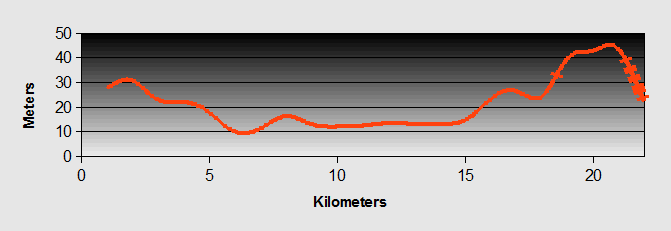
Western-Visayas - Atmosphere to Kukoo's Nest Ride Profile
Ride Description
Negros is divided into two regions. The northwest of the island is Negros Occidental and this part lies within the Western-Visayas. Negros Oriental in the south and east of the island is actually within the Central Visayas are along with the main island of Cebu.
After a break from cycling of more than 4 weeks and all the excesses of
Christmas and New Year we decided the first day back on the road should
be a short one. It was past 10am before we hit the road and the short
ride up the rough and bumpy Atmosphere drive was enough to cause a bit
of panting.
Like most of the islands of the Western-Visayas the main road runs around
the coast and here, about 25km south of the capital Dumaguete, it is
quite busy. The traffic consists of Ceres buses which ply the Western Visayas travelling very fast and
their drivers expect total subservience from all other road users, moderate sized
lorries carrying sugar cane to the refineries, jeepneys and motor
trikes. Bicycles are unusual but gradually gaining popularity. With the
Philippines flags that Simon and Emma had given to us for Christmas
fastened to the back racks we were constantly greeted and waved at by
everyone we passed.
After 7km is the village of Malatapay which holds it's famous bartering market every Wednesday morning. We have been there before but the busy, bustling mayhem of the place is magic. Vehicles of all sizes struggle to drive between the market stalls carrying their cargo of live animals to the livestock market. Pigs, goats and cattle in lorries, on tricycles, lashed to the rack of a motorbike or just led on foot with a rope harness. The highlight of the morning is the delicious roast pig (lechon) cooked whole on a spit and served in chunks with steamed rice. After only 30 minutes riding we were sitting down for a feast.
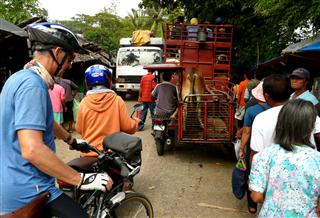
From there it was only another 6km of flat tarmac before the turn off to Bonbonon Bay. This is mostly an unsurfaced road with a few cemented sections. It is well graded and shaded with tall trees. There are several short steep climbs and descents but the last one, up to the top of the headland and Koo Koo's nest is the steepest with a loose stone surface and we had to push up the last section.
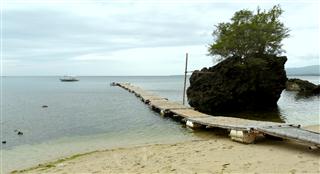
The resort is beautiful with just a few bamboo cottages built on stilts on the beach, a restaurant and a small dive shop. We spent the afternoon relaxing, snorkeling and wading round the rocky headland with the resident resort dogs. Unfortunately Steve slipped on a rock and dropped the camera into the sea. It died instantly.
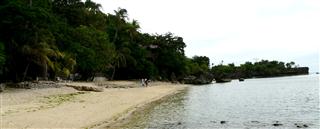
Western-Visayas: Day 2 - Kukoo's Nest to Bayawan
- Distance 70km
- Max Elevation 125m
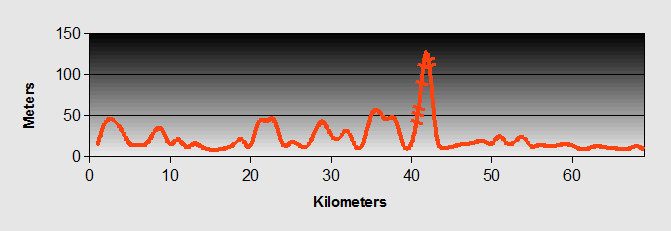
Western-Visayas - Kukoo's Nest to Bayawan Ride Profile
Ride Description
Continuing our Western-Visayas ride we headed out from the resort and returned along the track for 4km to rejoin the unsurfaced road that continues around the bay. The morning was cool and cloudy with slight drizzle and the dirt road climbed up and down through forest and palms. There was hardly any traffic but plenty of people on foot.
At the village of Bonbonon we passed the ruin of an old convent and then rejoined the main road. It rolled gently up and down but the wind in our faces made it seem harder work. The next town was Siaton and for the first time we missed Vietnam where there is always a cafe serving glasses of iced coffee with a shady seat. We had to be content with a bottle of Pepsi and a straw. The streets here were busy but the majority of the traffic was bicycle cabs so it was much more peaceful.
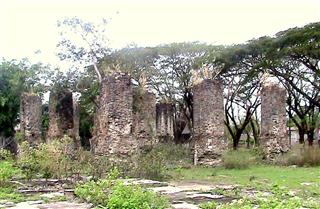
From here the road was significantly quieter with just the occasional Ceres bus and motorbikes. There were a few rolling hills to climb around Gillgaon Point but then the road was flat all the way to Bayawan. This town claims to have the longest beach side boulevard in Negros but it has no other tourist infrastructure.
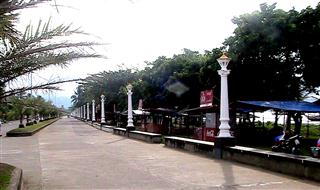
There was a small hotel near the bus station, advertising a range of rooms at different prices. The receptionist told us that all the rooms were full except for the most expensive 'suite' room so we booked that. Don't be misled, it wasn't luxurious, it just had a settee and two small armchairs as well as the bed. We never saw or heard another guest.
Western-Visayas: Day 3 - Bayawan to Sipalay
- Distance 88km
- Max Elevation 185m
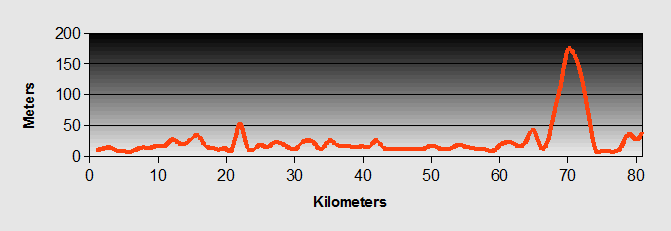
Western-Visayas - Bayawan to Sipalay
Ride Description
The hotel breakfast was served in the Internet cafe next door on a little table in the middle of the lines of computers and monitors. The typical Western-Visayas breakfast consists of cold rice, cold fried egg and either fish, ham or beef (cold, of course). We had to pay extra because we wanted a cup of coffee, no drink was included.
We set off along the wide, impressive boulevard, a dual-carriageway with grand lamp-posts. The tide was out and the large fishing boats were stranded on the pale sand. After 750m it stopped abruptly in a heap of earth and we had to do a u-turn and return to the main road. The sky was clear today so it was much hotter, but there was still a cooling breeze.
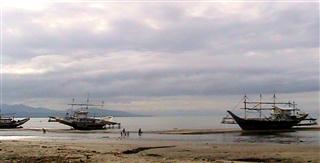
Heading north on our Western-Visayas ride we had a few more rolling hills to climb on smooth tarmac
with only light traffic. About 20km north of Bayawan we passed a beach
resort called Fantasea which looked like a good, budget place to stay.
The next town was Santa Catalina where we had a morning break. Beyond
that there were major roadworks. The road was being concreted. Several
sections were complete and they were wide and silky smooth with the
luxury of a hard-shoulder. Between these the surface was very rough and
loose. All of the river bridges were being replaced. It was quite hard
work in the hot sun but with little motor traffic it was bearable. Once
back on the smoother surfaced road we noticed that one of Karen's rear
spokes had broken, another repair needed.
In the early afternoon we came across the first reasonable restaurant/bar at the roadside and pulled in for a drink. There was a party of about eight cyclists there with a guide, doing a 2 week supported ride around the Central and Western Visyays organised by Bugoy Bikers in Cebu. We chatted to them for a while but they were travelling in the opposite direction so we parted. It was only 25km now to Sipalay and a 310m hill to climb on the way. The compensation was in the fabulous views over Campomanes Bay on the way up.
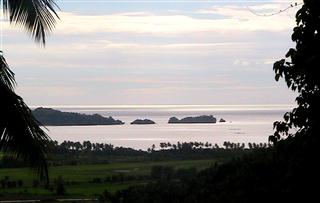
At Sipalay we felt we were almost finished so had a beer in one of the
cafes on the beach while we telephoned Artistic Diving, a resort at the
Punta Ballo beach. When we asked her, the receptionist assured us that
the road there was 'just a bit up and down' but nothing too bad. After a
beer, the 7km of steep hills and descents felt more like crossing the
Alps. To make matters worse, it poured with rain the whole way so we
arrived bad-tempered, muddy and soaking.
The beautiful beach and lovely resort made all the suffering worthwhile
and we enjoyed a few more beers and a delicious meal in the restaurant
watching the continuing rain.
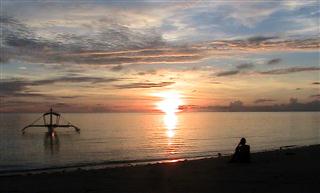
Western-Visayas, Punta Bello - Day Off
The weather was better today and Steve did two enjoyable dives while Karen did some snorkeling. It was warm and sunny and we enjoyed chatting to the other guests, mainly German and Swiss. One couple, Matt and Karen, had spent the last 10 years running a dive resort in the Maldives and were in the Western-Visayas getting a feel for the diving before considering taking a job managing a dive resort near Dumaguete. Maybe we'll meet them later. Steve also had time to replace Karen's spoke and re-balance her wheel.
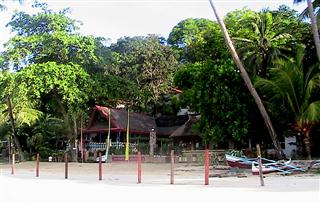
Western-Visayas: Day 4 - Sipalay to Kabankalan
- Distance 83m
- Max Elevation 128km
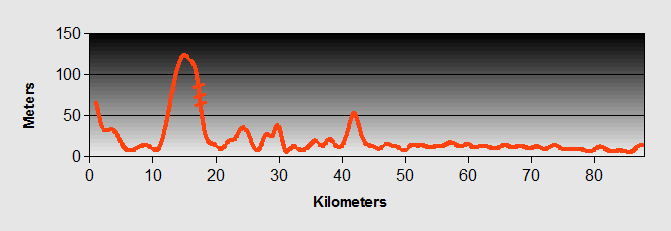
Western-Visayas: Day 4 - Sipalay to Kabankalan Ride Profile
Ride Description
Knowing there were a few hills on the road out of Sipalay we decided to
hire a tricycle to take us from the resort into town. With the bikes
lashed on the back and our gear stuffed around our feet we enjoyed the
steep hills and views that we had missed because of the rain. In Sipalay
we brought new lube for the rusty bike chains and searched in vain for
an ATM.
The road north was smooth and quiet, just the occasional motorbike.
There were more hills as we approached the top of the 'heel' of Negros.
The gradient was gentle and leveled out regularly. It was only about
150m high but the lovely sweeping descent on the other side was a joy.
The villages we rode through were friendly and neat but they were poor
with few shops or places to eat. Just as we were about to loose hope of
lunch there was a little bamboo shack at the roadside overlooking the
sea. It was called 'Little Shamrock' and promised coffee and food. It
was actually owned by a Dutch man, married to a Philippine lady and they
had only started trading 2 weeks ago. His wife served us some
traditional chicken soup with vegetables and rice. It was delicious and
we wished them luck with their business.
Sugar cane is the most abundant crop in this Western-Visayas with vast fields of
tall green canes. It is a very labour intensive harvest with gangs of
men cutting the cane by hand with machete type knives. Then it is all
loaded by hand into large high sided lorries to be transported to the
refineries.
From here it was a level ride all the way to Kabankalan. The town was
holding its annual music festival and tonight was the climax.
Unfortunately it meant that a lot of the accommodation was fully booked
but we found a nice, newish place called West Side Inn with a vacant
room. That night we were so tired that we just walked to the nearest
restaurant, ate and went back to bed. We just couldn't face the throng
and noise of the festival.
Western-Visayas: Day 5 - Kabankalan to Bago
- Distance 80km
- Max Elavation 30m
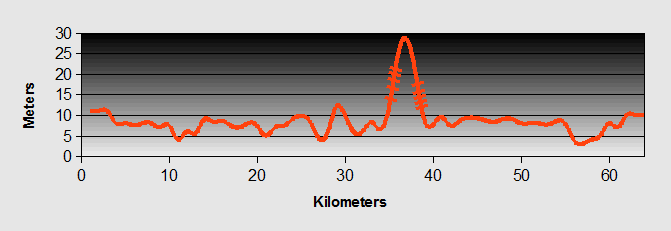
Western-Visayas - Kabankalan to Bago Ride Profile
Ride Description
It was not a pleasant ride today. We were now into the more intensive agricultural and industrial part of the Western-Visayas and the road was busy and noisy. There was only a rough hard shoulder and the buses here hunted in packs. Usually in threes, the Ceres buses would come up behind at great speed. The first one would pull out just enough to pass but the two behind were travelling so close that they couldn't see the bikes so we had to drop onto the rough several times. It was hot and there was a head wind.
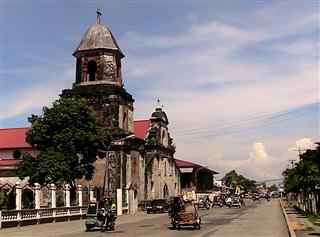
The plan was to get a ferry over to the small island of Guimares, also in the Western-Visayas and which
lies between Negros and Panay. We wanted to get one from Valladolid but
we arrived about 12md and the daily ferry had departed at 10am. A
tricycle driver advised us to continue on to Pulupandan, where there
were 'frequent ferries'. But actually there were only two a day and the
last one had left an hour ago. An elderly local pointed us in the
direction of a small boat yard which could rent us a private bangka. The
problem was that it would cost 2,000 pesos, compared with 200 for the
ferry.
We decided to continue into Bago for the night and return to get on the
7.30am ferry the next day. There was only one place to stay in Bago.
Called 'L E Pension', it occupied the second floor of a small shopping
centre and took a lot of finding.
Western-Visayas: Day 6 - Bago to Iloilo
- Distance by road 34km
- By Sea 47km
Ride Description
Today was one of those days when it seems the whole World is ganging up
on you to make life difficult. The room in the pension had no outside
window so we set the alarm for 6am so that we would have plenty of time
to get to the ferry. Packed and ready to leave we went outside to find
it was pouring with rain and blowing a gale.
In the little shopping centre cafe we brought coffee and local breakfast
and considered the options. The idea of getting a little open bangka to
Guimaras in the rough sea was not attractive. Instead we set off to
cycle 20km to Bacolod and get the passenger ferry to Iloilo on Panay.
The road was being resurfaced and so half the road was closed off and
all the traffic squeezing past on the other lane. Luckily the hard
shoulder was closed off but not obstructed so we rode along that. Before
setting off Karen's front tyre had to be pumped up as it had a slow
puncture, and halfway to Bacolod we had to stop and mend the puncture.
Arriving at Bacolod we were immediately lost in the busy traffic and
incomprehensible one-way system. Finding sanctuary in a cafe we asked
the staff the way to the ferry port. We might as well have asked them
the way to the moon for all the help they were. They acted as if they
had never heard of an island called Panay, let alone a city called
Iloilo.
It was raining again as we rode down the hill towards the sea and the
probable port location. We saw a queue of lorries and cars and thought
that was it, but in fact they were waiting at the Vehicle Emissions Test
Centre. Eventually we found the ferry and brought a ticket at the first
counter, paid a 'Terminal Fee' at the next, then had to check the bikes
in at the freight counter. Luckily there was plenty of time to spare.
We boarded the boat and the bikes were loaded by the porters. We learned a
valuable lesson - always supervise the loading of the bikes. Arriving
at Iloilo an hour later we discovered that Karen's front tyre had rubbed
so badly on something that all the side webbing had ruptured and it
needed replacing.
The traffic in Iloilo was about the worst we have encountered in the Western-Visayas. It seems like all of the tricycle and cyclocab owners have been persuaded to trade-up to a modern, long wheelbase, jeepney style multi cabs. The whole town was nose to tail with them. They stop anywhere to pick up and drop off passengers and the drivers never look before they pull off again. We attempted to ride to Jaro, about 3km north, to see the 'china town' but gave up half way because the traffic was manic. Instead we rode to Moro, to see the old church.
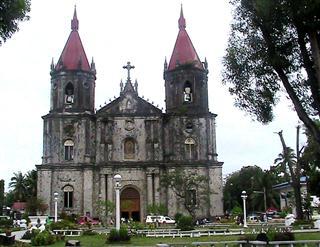
After searching around the quieter backstreets we managed to find a replacement tyre and as we locked the bikes up at the hostel Steve discovered he had a broken spoke. Strange, after three years cycling with no wheel problems we each get a broken spoke within four days.
Western-Visayas: Day 7 - Iloilo to Guimbal
- Distance 30km
Ride Description
Intending to go the the island of Guimaras, we packed up ready to ride into Iloilo and get the ferry. The wind was still blustery and the thought of having to get through the awful traffic brought a change of mind. Instead we set off west, along the coast, with the wind at our backs, towards Guimbal. As we passed a school we could hear music and drums and got a view of the teenagers practising for their festival.
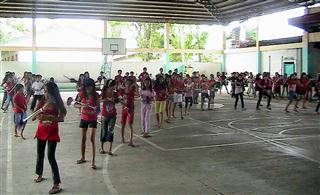
It was a short, easy day although the traffic was quite busy at first. The towns along this section of the Western-Visayas all have old Catholic churches, originally built in the 1600's by the Spanish. It is such a change to see old architecture that we took photos of all of them.
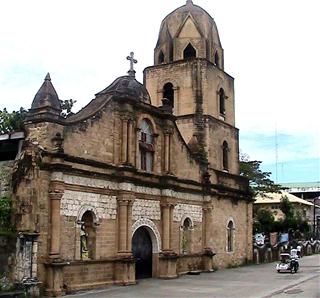
Along this coast are the remains of the look-out towers, built in the
1500's. They were built to enable the people to keep watch for the
approach of the Moro pirate boats, searching for valuables and able
bodied people to sell as slaves.
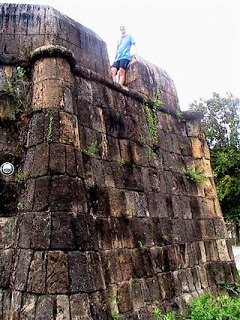
Guimbal had to be our next stop as the next reliable accommodation was in San Jose, a further 70km. The resort recommended in the 'Rough Guide' was tired and the rooms smelly and expensive so we booked into the Rosco's Garden resort over the road. It was an interesting little place with a small zoo as well as a swimming pool and gardens which was popular with the locals but in need of some renovation.
Western-Visayas: Day 8 - Guimbal to San Jose de Buenavista
- Distance 68km
- Max Elevation 308m
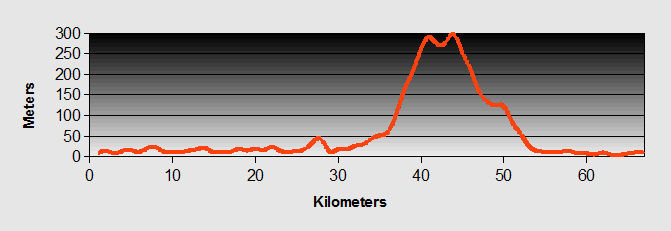
Western-Visayas - Guimbal to San Jose de Buenavista Ride Profile
Ride Description
We ate breakfast by the swimming pool, watching a group of finches making nests in the creeper over our heads. The wind had dropped at last and the sea was like a mill pond. By coffee time we had arrived at Miagao with the most impressive ancient church yet, with a carved facade depicting typical local themes and two towers. It was a struggle to find a peaceful place for coffee. The locals love their music and weather it is videoke or just the radio the volume is always on maximum with lots of bass.
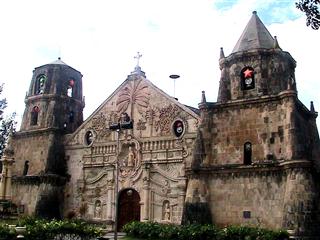
20kms further on we turned away from the coast to climb over the short peninsula toward San Jose. It was a long, gentle climb and a good road surface but the sun was hot and there wasn't a breath of wind. The sign at the bottom raised our hopes of finding a fortune but the search was fruitless.
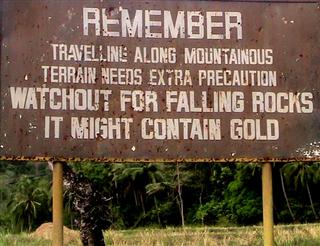
At about 11.30 the children go home from school so there were lots of
them walking along the road as we toiled up the hill. One lad tried to
race Steve, running along at his side for quite a way and pushing the
bike along. As he tired he decided to try to jump onto the rack for a
lift. This extra weight brought Steve to a complete halt and he had to
forcibly evict him.
After two false summits we eventually reached the top, at the border of
the Antique provinceof the Western-Visayas, and picked up a cooling sea breeze from the west
coast. At the bottom of the descent there was a small village and a
welcome eatery. It was already 1.30pm and there was little left but the
lady owner welcomed us warmly and we ate fish steaks with jack fruit and
bean casserole which was the most delicious food yet. There were men in
the back garden chopping down a coconut tree so we had free green
coconut juice as well.
Following the coast road north it was just 10km further to San Jose where we had booked bed and breakfast in a place called 'Biniraven Cottages' just on the outskirts of the town.
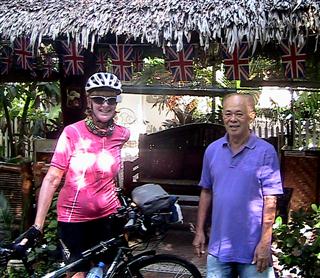
Western-Visayas: Day 9 - San Jose de Buenavista to Tibiao
- Distance 85km
- Max Elevation 51m
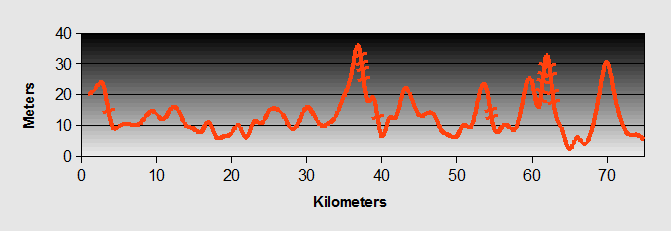
Western-Visayas - San Jose de Buenavista to Tibiao Ride Profile
Ride Description
Today we continued to follow the Western-Visayas ride along the Panay coast north. This area was described in the Rough Guide as one of the poorest in the Philippines, but we saw more signs of wealth here than on the south coast of Negros. The road was well surfaced and there were plenty of 4wd vehicles going past us.
On our right were the towering steep sided mountains with just a thin strip of flat rice paddies before the ocean on our left. We rolled into the town of Bugason at lunchtime. They were in the middle of their patronage festival and as we searched for somewhere to eat lunch we came across a crowd of locals blacked up for a parade. They were happy to pose for a photo as long as we put cash into their collecting boxes.
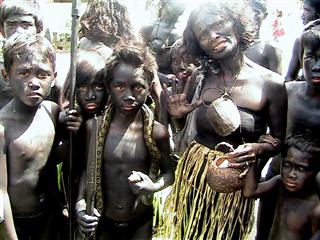
At the corner of the market there was a small eatery with the most delicious and cheap food yet.
By now the moderate head wind which had made us work hard all morning
had increased and the next 40km was challenging and tiring. The rice
paddies gave way to sugar cane as this area of the Western-Visayas calls itself the 'Muscovado
Capital'. Here the locals call all Western men 'Joe' and by late
afternoon Steve's temper was getting thin as he just wanted to tell
everyone his name was Steve, not Joe.
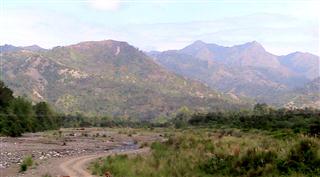
The only accommodation that was listed along this whole Western-Visayas coast was a
place called 'Kayak Inn', about 9km north of Tibiao. It is run by a
company called 'Tribal Adventures' in Boracay. We reached the turn-off
and realised that 7 of those kilometres were uphill on an unsurfaced
road and that there was no food available there so turned back to
Tibiao. There we were directed to the university campus which rents out
rooms. Apparently they run a course for students wanting to work in the
hotel industry and have a small ' Homtel' where they get their work
experience.
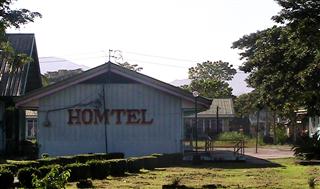
In the evening we walked to a little restaurant behind a petrol station on the main road. As usual we were the only people eating. A middle aged man arrived alone on his motorbike and asked for the videoke to be switched on. He stood on the garage forecourt, sung a couple of his favourite songs and then went home!
Western-Visayas: Day 10 - Tibiao to Boracay
- Distance 97km
- Max Elevation 80m
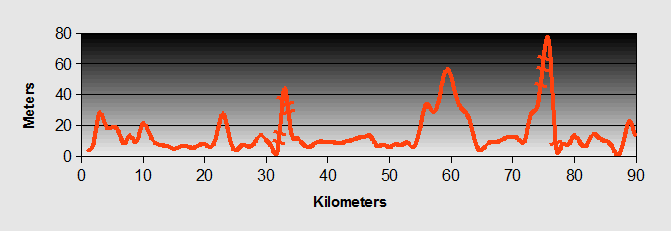
Western-Visayas - Tibiao to Boracay Ride Profile
Ride Description
We were the only people staying in the Homtel. The students asked us what time we would like breakfast and it was arranged for 7.30 am. As usual, although there were only two breakfasts to prepare, they had been cooked it hours in advance and the eggs and bacon were stone cold.
Leaving Tibiao the road was quite sheltered for the first ten kilometres and very flat, through rice terraces. Further north we came into a very strong wind. It was blowing from the north west and varied according to the road direction from full head on or an equally daunting cross wind, blowing the bikes into the centre of the road. Either way it was very hard work and reduced our average speed to 9kmh. The dark clouds over the mountains were threatening but the rain kept off.
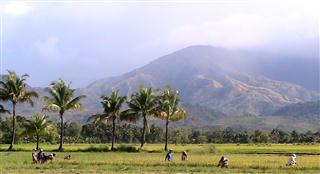
Lunchtime found us in Pandan and on a restaurant search. Quite by chance
we found a place near the market owned by a Swiss man and his local
wife, with a good choice of international food. The rosti potatoes were
so enjoyable after days of rice. From there we took the slightly shorter
route to Caticlan via Nabas and then along the north Panay coast. Here
it was sheltered from the wind but the steep hills up and down the
headland taxed the legs somewhat.
The ferry port at Caticlan was heaving with tourists, masses of them
arriving in coaches, mini-buses, taxis and tricycles. Because we had the
bikes we were directed to the Montenegro ferry which was a normal boat
(ie, with no outriggers) and easier to load the bikes onto than the
bangkas.
Arriving at Boracay, the rain which had been threatening all day finally
arrived and it was dark and miserable. By the time we had ridden up to
White Beach we were soaked so searched out a bar on the beach side to
relieve the pain with beer. The problem was that the price, 60 peso, was
3x what we had been paying on the other islands. The bar menu also had
peanuts, usually free, for $2 a dish.
Accommodation was also roughly 3x the price of most other places in the Western-Visayas so we had to search hard to find something in our price range, eventually settling for a room in a house with four double beds. What a problem deciding which one to sleep in.
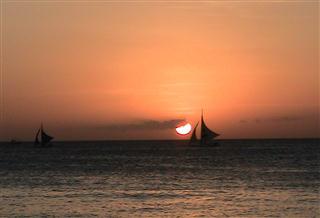
Boracay - Day Off
Boracay really does have a most beautiful white, sugary beach but it has
been spoilt by excessive development. The sea is full of boats, the
boats are full of divers and the sea front heaves with tourists. The
worst ones are the large groups of Korean/Taiwanese/Chinese who do
everything together and follow each other around.
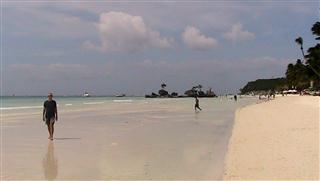
One day was enough for us and tomorrow we would move on to the Romblon Islands, which are not part of the Western-Visayas. That evening the housekeeper of the house we were staying at cooked us three huge pizzas for tea for free a significant help for the stretched finances.
Our trip continues from Boracay and Caticlan to Romblon and Masbate.
Or
Return to our Tours page from Cycling the Philippines Western-Visayas
New! Comments
Have your say about what you just read! Leave me a comment in the box below.